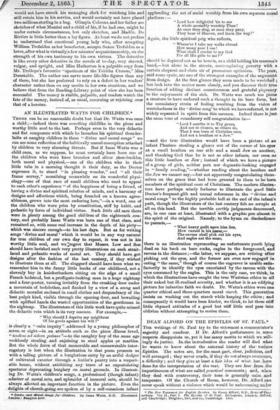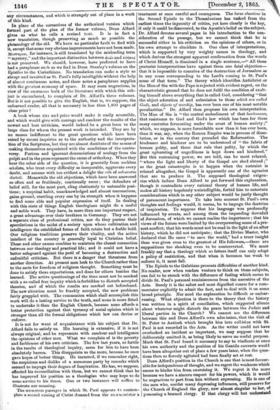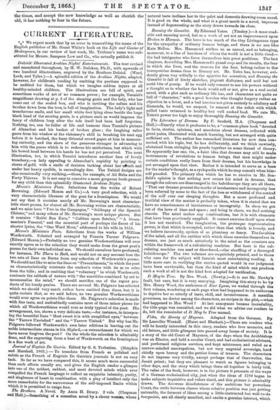DEAN ALFORD ON THE EPISTLES OF ST. PAUL.* Tux writings
of St. Paul try to the uttermost a commentator's sagacity and candour. If Dr. Alford's performance in some respects disappoints us, yet it has many merits to which we will- ingly do justice. In, the introduction the reader will find what he wants to know about the external history of the various Epistles. The notes are, for the most part, clear, judicious, and well arranged ; they never evade, if they do not always overcome, a difficulty ; and they give at least a fair idea of what has haen done for the interpretation of the text. They are free from the impertinences of what are called practical comments ; and, when they deal with controversy, their tone is generally calm And temperate. Of the Church of Rome, however, Dr. Alford can never speak without a violence which would be unbecoming under
• The New Testament for English Ressler*. By Henry Alford, D.D., Dean of Can- terbury. Vol. 11, Part 1. The Eisislks of St. Paid. Biringtons, Loaduti, Oxford, and Cambridge; Deiglitoo, Bell, and Ono thunpriddn. ISO&
any circumstances, and which is strangely out of place in a work of this kind.
In place of the corrections of the authorized version which formed . part of the plan of the former volume, Dean Alford gives us what he calls a revised text. It is in fact a new translation, though preserving as much as possible the phraseology of the old. We have no particular fault to find with it, except that some very obvious improvements have not been made. Marv/0y, for instance, is still translated by the misleading term "mystery," and the important distinction between aic:n■ and x6o.i.co; is not preserved. We should, however, have preferred to have had a paraphrase such as we find in Dean Stanley's volume on the Epistles to the Corinthians. No translation can make a style so abrupt and involved as St. Paul's fully intelligible without the help of almost continuous notes, and these notes a paraphrase supplies with the greatest economy of space. It may seem ungracious, in view of the enormous bulk of the literature with which this sub- ject is encumbered, to complain of Dr. Alford's three volumes. But is it not possible to give the English, that is, we suppose, the unlearned reader, all that is necessary in less than 1,800 pages of close print?
A book whose size and price would make it easily accessible, and which would give with courage and candour the results of the newest and best criticism, would indeed be a great boon to the large class for whom the present work is intended. They are by no means indifferent to the great questions which have been raised by recent inquiries as to the authority and the interpreta- tion of the Scriptures, but they are almost destitute of the means of making themselves acquainted with the conditions of the contro- versy. Furious and ignorant denunciations of neology from the pulpit and in the press represent the cause of orthodoxy. When they hear the other side of the question, it is generally from reckless sciolista, who treat every difficulty as insuperable, aggravate every doubt, and assume with too evident a delight the role of advocatus diaboli. Meanwhile the old objections, which have been answered so often and so fruitlessly, continually recur ; the defenders of belief still, for the most part, cling obstinately to untenable posi- tions; a sceptical habit, unacknowledged and almost unconscious, gains ground, startling every one by its strength when it happens to find some able and popular expression of itself. In dealing with this state of things English theologians might do a useful and noble work. They have, in more than one important respect, a great advantage over their brethren in Germany. They are not a separate class of professional critics, nor do they pursue their speculations in the midst of a society upon whose cultivation and intelligence the established forms of faith retain but a feeble hold. Our religious traditions preserve their vitality, and the active intellect of the country is generally loyal to Christian belief. 'These and other causes combine to maintain the closest connection between our theology and practical life ; and it could not have a better safeguard against the peril of becoming a destructive and unfruitful criticism. But there is a danger that threatens from another direction. At present men look to the Church rather than to the sects for freedom of religious thought. Something must be done to satisfy these expectations, and done for others besides the learned. The active questionings of the time must not be mocked with a so-called free inquiry which is forbidden to disturb accepted theories, and of which the results are marked out beforehand. The new situation must be frankly accepted, the new problems fairly grappled with. The communion which shall accomplish this work will do a lasting service to the truth, and none is more fitted to undertake it than the English Church, because none affords a better protection against that tyranny of social opinion which is stronger than all the formal obligations which law can devise or enforce.
It is not for want of acquaintance with his subject that Dr. Alford fails to satisfy us. His learning is extensive, if it is not always original, and he represents with candour and intelligence the opinions of other men. What we complain of is the poverty and feebleness of his own criticism. The few last years, so fertile in the results of theological inquiry, seem for him to have been absolutely barren. This disappoints us the more, because he once gave hopes of better things. He incurred, if we remember right, the suspicions and dislike of a numerous party by remarks which seemed to impugn their dogma of Inspiration. He has, we suppose, effected his reconciliation with them, but we cannot think that he has improved his position as a theologian who may hope to do some service to his times. One or two instances will suffice to illustrate our meaning.
The numerous passages in which St. Paul appears ta contem- plate a second coming of Christ demand from the commentator a
treatment at once careful and courageous. The locus classicus in the Second Epistle to the Thessalonians has tasked from the earliest times the ingenuity of critics, yet here clearly is the key, if only it could be discovered, to the Apostle's belief on the subject. Dr. Alford devotes several pages in his introduction to the con- sideration of the passage, but we cannot think that he is successful either in his criticism on the opinions of others, or in his own attempt to elucidate it. One class of interpretations, which is supported by very weighty names in theology, and which derives the strongest apparent confirmation from the words of Christ Himself, is dismissed in a single sentence,—" All these prseterist interpretations have against them one fatal objection— that it is impossible to conceive of the destruction of Jerusalem as in any sense corresponding to the Lord's coming in St. Paul's sense of that term." The theory which identifies Antichrist or the Man of Sin with the Pope is rejected with evident regret, on the characteristic ground that he does not fulfil the condition of exalt- ing himself above everything that is called God, considering "that the abject adoration of and submission to those which are called Gods, and objects of worship, has ever been one of his most notable peculiarities." Dr. Alford then proposes his own interpretation. The Man of Sin is "the central embodiment of that lawlessness, that resistance to God and God's law which has been for these many centuries fermenting under the crust of human society ;" which, we suppose, is more formidable now than it has ever been, than it was, say, when the Roman Empire was in process of disso- lution, or in the century that preceded the Reformation. The hindrance and hinderer are to be understood of "the fabric of human polity, and those that rule that polity, by which the great upbursting of ungodliness is kept down and hindered." But this restraining power, we are told, can be most relaxed, "where the light and liberty of the Gospel are shed abroad ;" as the reat catastrophe is to happen when the restraint is relaxed altogether, the Gospel is apparently one of the agencies that are to produce it. The supposed theological exigen- cies which induce Dean Alford to put forward this explanation, though it contradicts every rational theory of human life, and makes all history hopelessly unintelligible, forbid him to entertain considerations which in any other subject would be justly thought of paramount importance. To take into account St. Paul's own thoughts and feelings would, it seems, be to impugn the doctrine of 'inspiration. To suppose that his language was profoundly influenced by events, and among them the impending downfall of Jerusalem, of which we cannot realize the importance ; that his views of the future were limited by the overpowering sense of a pre- sent conflict; that his words must not be read in the light of an after history, which he did not anticipate ; that the Divine Master, who declared that He came "to save the world," had a truer insight than was given even to the greatest of His followers,—these are suppositions too shocking even to be controverted. We must frankly say that a theology which so fetters itself can only adopt a policy of restriction, and that when it becomes too weak to enforce it, it must fall.
The Epistle to the Galatians presents difficulties of another kind. No reader, now when readers venture to think on these subjects, can fail to be struck with the difference of feeling which seems to divide St. Paul's personal reminiscences from the narrative of the Acts. Surely it is the safest and most dignified course for a com- mentator explicitly to admit the fact, and to deal with it on some broad principle. Nor need the explanation be difficult or embar- rassing. What objection is there to the theory that the history was written in a spirit of conciliation, which suggested silence about whatever might disturb the peace between the Judaic and liberal parties in the Church? We cannot see the difference between this and Dean Alford's own admission, that the visit of St. Peter to Antioch which brought him into collision with St. Paul is not recorded in the Acts. As the writer could not have overlooked an incident so important, we may suppose that he deliberately omitted it, as being likely to serve no useful purpose. Much that St. Paul found it necessary to say to vindicate at once his own authority and the position of his Gentile converts would have been altogether out of place a few years later, when the ques- tions then so fiercely agitated had been finally set at rest.
Dean Alford's position in the Church is one that is most favour- able for independence of thought, and we regret the weakness which seems to hinder him from exercising it. We regret it the more because we have a sincere respect for his powers, which it would be ungracious to part from him without expressing. He is one of the men who, amidst many depressing influences, still preserve for the Church of England the glory, now almost singular to her' of possaraing a learned clergy. If that clergy will but understand
the times, and accept the new knowledge as well as cherish the old, it has nothing to fear in the future.




































 Previous page
Previous page